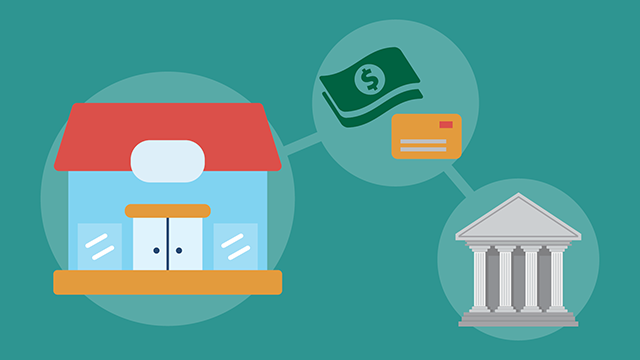The Duty of Credit Rating in Securing Local Business Loans for Entrepreneurs
In the affordable landscape of entrepreneurship, protecting a bank loan typically pivots on the pivotal element of credit history. These ratings work as a numerical representation of an entrepreneur's creditworthiness, influencing loan providers' choices and the terms used. A higher credit rating can open doors to desirable car loan problems, while a reduced rating might provide significant barriers. What specifically affects these ratings, and just how can business owners purposefully boost them to enhance their opportunities of securing crucial funding? The solutions to these concerns hold the key to unlocking prospective development possibilities for local business.
Comprehending Credit Report Scores
Credit rating are essential numerical depictions of a person's creditworthiness, serving as a critical aspect in monetary decision-making for lenders. These scores are originated from a thorough evaluation of an individual's credit report, incorporating elements such as settlement history, credit rating usage, length of credit report, brand-new credit report accounts, and types of credit score utilized. Typically ranging from 300 to 850, higher ratings signify reduced threat to lending institutions, while lower ratings indicate greater threat.
The calculation of credit history is executed by credit score bureaus using exclusive algorithms, with one of the most widely recognized models being FICO and VantageScore. Each model might consider aspects slightly in different ways, yet they all goal to supply a constant measure of credit rating threat. A strong credit rating reflects the person's dependability in handling financial obligation, making prompt settlements, and preserving a healthy and balanced equilibrium between credit history utilized and offered debt.
It is essential for individuals and company owner to understand their credit rating, as these figures can have significant implications beyond personal money. Frequently checking one's credit history record, dealing with errors, and taking on audio economic practices can substantially enhance credit rating, thereby enhancing the individual's overall economic profile and creditworthiness.
Value for Loan Approval
Understanding one's debt score is fundamental, as it plays a substantial duty in the procedure of loan authorization for small companies. Lenders make use of credit rating as a main metric to analyze the creditworthiness of candidates. A solid credit rating suggests a history of responsible monetary actions, recommending to lending institutions that the candidate is likely to settle the funding in a timely manner. A high credit rating rating can dramatically boost a business owner's chances of safeguarding a financing with positive terms, consisting of reduced passion rates and even more flexible repayment choices.
In contrast, a low credit rating could indicate potential risk, leading lending institutions to either decline the finance application or impose more stringent conditions. This makes it necessary for business owners to be aware of their credit score standing, as it straight influences their capacity to access capital. Credit report scores offer as a standard measure that makes it possible for loan providers to improve their decision-making process, making certain efficiency and uniformity. As small companies frequently require prompt accessibility to funds for development and sustainability, maintaining a durable credit rating score becomes vital. Thus, understanding and handling one's credit history is a crucial part of planning for loan applications and attaining company success.
Factors Affecting Ratings
Several elements add to the decision of a credit rating, each playing a pivotal role in shaping an individual's credit history account. A high proportion of made use of debt to offered credit score can recommend economic overextension, negatively impacting creditworthiness.
Size of credit rating history likewise aspects into credit history computations, with a much longer credit history generally seen much more positively. This metric offers understanding right into the person's long-term moved here economic actions, offering lenders a broader viewpoint on their credit report management abilities. Furthermore, the kinds of credit in operation are thought about, as a mix of charge account, such as rotating bank card and installment car loans, can show the capacity to handle various monetary obligations.
Last but not least, current credit score queries might affect ratings (pre approval student loans). Constant applications for brand-new credit scores can indicate economic distress, therefore negatively influencing the score. Each of these aspects is critical in the extensive examination of a credit history, impacting a business owner's capability to protect a bank loan
Improving Your Credit History
Improving one's debt score belongs to nurturing a yard; mindful interest to crucial areas can produce significant linked here improvements. To start, ensuring prompt settlements on all debt accounts is critical. Repayment background makes up a significant section of a credit report score; thus, establishing automated repayments or suggestions can aid preserve consistency. In addition, lowering debt degrees is essential. High debt application proportions, or the amount of credit scores utilized about the credit limit, can negatively affect ratings. Aim to maintain use below 30% of total offered credit rating.

Last but not least, preserving older credit accounts can favorably influence the ordinary age of credit history, which is another variable in scoring designs. While new credit report inquiries ought to be decreased to avoid short-lived score dips, liable debt administration gradually will naturally result in score renovation, therefore boosting eligibility for desirable small company car loan terms.
Alternative Funding Options
Browsing the globe of small business funding typically requires exploring alternate options past conventional small business loan. Business owners with less-than-ideal credit history might locate these choices not only more obtainable however likewise tailored to their special company needs. Among one of the most preferred options are online loan providers, anchor which have multiplied in current years. These systems generally offer much faster authorization procedures and more flexible terms than standard financial institutions, usually thinking about variables beyond credit report, such as company performance and money circulation.
An additional practical option consists of crowdfunding, where entrepreneurs can raise capital from a large swimming pool of little financiers through systems like Kickstarter or Indiegogo. This method not only offers funds yet additionally validates company ideas via straight involvement with possible customers. Additionally, microloans, frequently offered by not-for-profit companies, provide to small businesses and startups. They offer smaller lending quantities with reduced rates of interest, making them optimal for business owners who call for restricted resources.
Billing funding and seller cash loan are likewise worth taking into consideration. The former entails offering impressive billings to a lending institution at a price cut, while the last gives a bear down future sales. Both options can enhance cash money circulation without the rigorous debt demands of conventional finances.
Conclusion

These ratings are acquired from an extensive analysis of a person's credit report history, incorporating facets such as settlement history, debt utilization, length of credit rating background, brand-new credit score accounts, and types of credit report used (pre approval student loans). A strong credit scores score mirrors the individual's dependability in managing debt, making prompt payments, and keeping a healthy and balanced equilibrium between credit history utilized and offered credit rating

Comments on “Why Pre Approval Student Loans Can Make University Much More Economical”